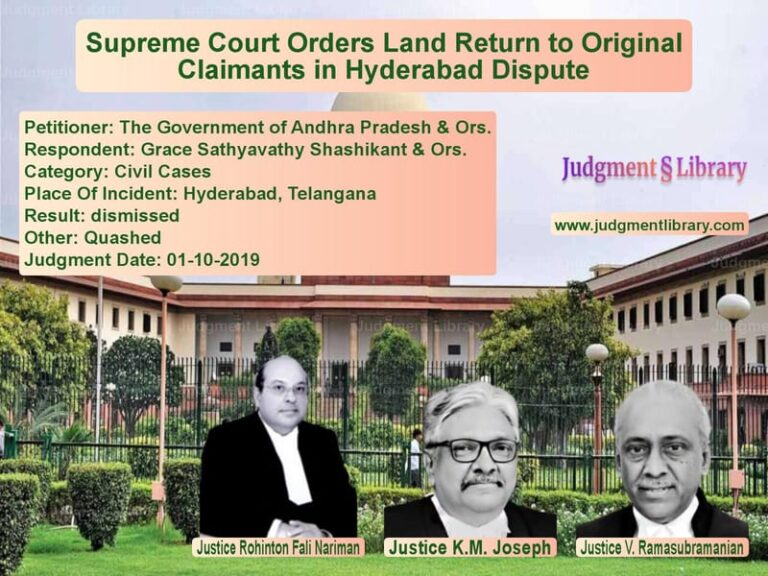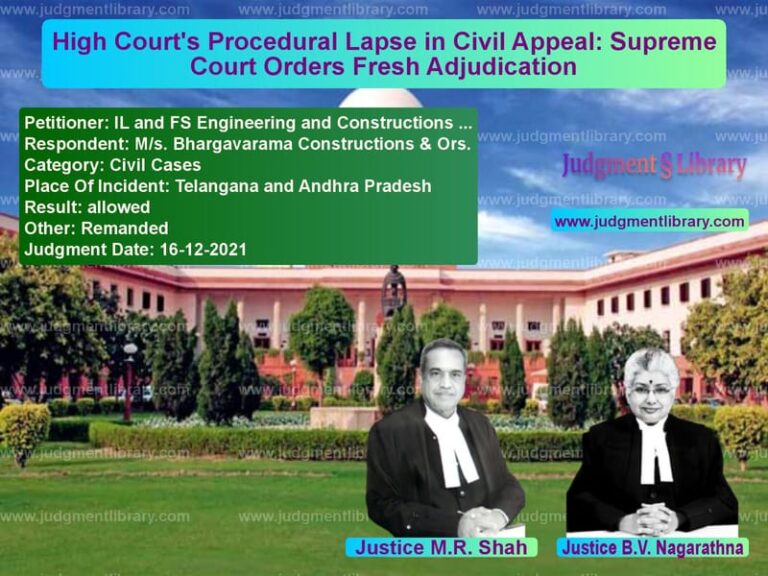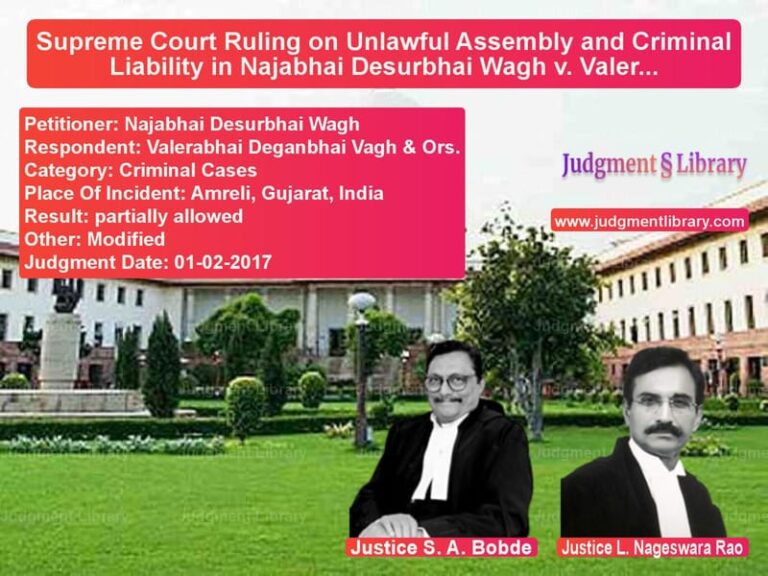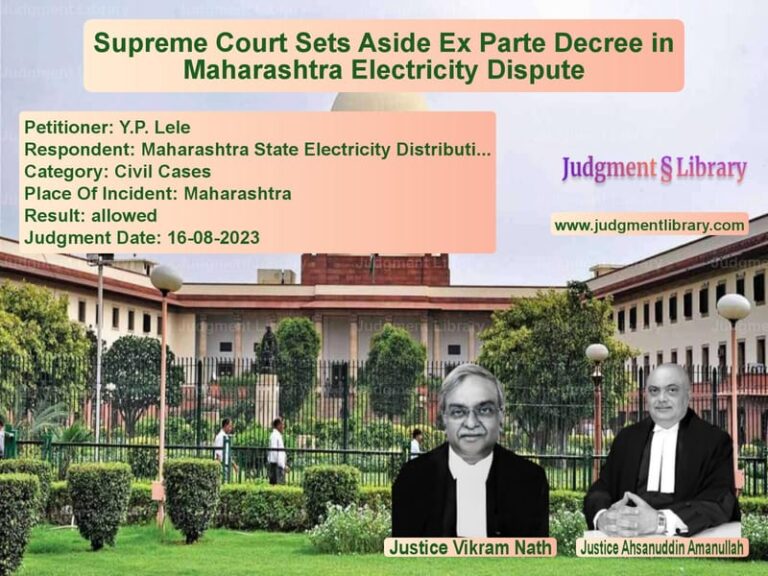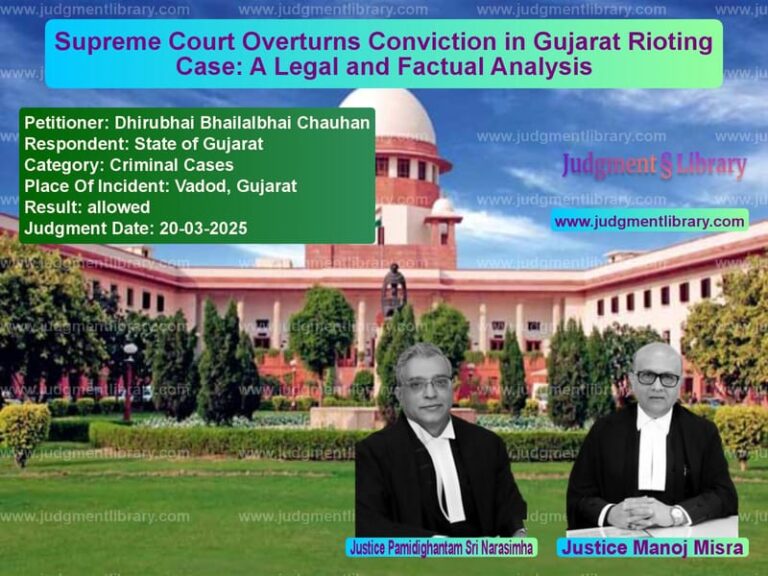Fraudulent Property Allotment: Supreme Court Cancels Plot Allocation for False Affidavit
The case of New Okhla Industrial Development Authority vs. Ravindra Kumar Singhvi (Dead) & Ors. revolves around the cancellation of a plot allotment due to a false affidavit. The Supreme Court ruled in favor of the New Okhla Industrial Development Authority (NOIDA), holding that the respondent, by concealing material facts, had fraudulently obtained a second plot, violating the terms of allotment. This ruling sets an important precedent on fraudulent property allotments and the legal consequences of misrepresentation.
Background of the Case
The respondent, Ravindra Kumar Singhvi, was allotted a residential plot (D-49, Sector-30, Noida) on October 6, 1981, as a member of the Defence Services Cooperative Housing Society. The possession of the plot was handed over to him on August 24, 1991.
However, prior to this allotment, the respondent’s wife, Smt. Amila Singhvi, was allotted another plot (Plot No. 84, Sector-15A, Noida) on March 10, 1981. The core dispute arose when NOIDA discovered that the respondent had filed a false affidavit, concealing the fact that his wife had already been allotted a plot.
NOIDA’s Notice and Plot Cancellation
On June 12, 1996, NOIDA issued a notice to the respondent, stating that his Sector-30 plot had been obtained through misrepresentation. NOIDA later canceled the allotment on October 18, 1996, citing violation of eligibility conditions.
The respondent challenged NOIDA’s cancellation and filed a suit for declaration, restraining NOIDA from reallocating the plot and from dispossessing him.
Petitioner’s (NOIDA) Arguments
NOIDA defended its decision, arguing:
- The respondent knowingly concealed that his wife had already been allotted a plot in Noida.
- NOIDA’s policy prohibits multiple allotments to the same family to ensure fair distribution.
- The respondent filed a false affidavit on December 1, 1988, claiming neither he nor his spouse owned a property in Noida.
- NOIDA was within its legal rights to cancel the allotment based on fraud.
Respondent’s (Ravindra Kumar Singhvi) Arguments
The respondent argued:
- The Sector-15A plot was transferred to a third party (Mrs. Kanta Modi) after obtaining NOIDA’s permission.
- His Sector-30 plot was the only property in his possession, and hence he was not in violation of the rules.
- There was no fraudulent intent or misrepresentation since the plot in Sector-15A was sold before the cancellation notice.
- The cancellation violated Section 14 of the Uttar Pradesh Industrial Development Act, 1976, which requires an opportunity to rectify any breach before cancellation.
Lower Court Rulings
The Trial Court ruled in favor of the respondent, holding that:
- The lease executed in favor of the respondent could not be canceled without due notice.
- The plaintiff had no fraudulent intent in acquiring the second plot.
The decision was upheld by the First Appellate Court and later by the Allahabad High Court on February 25, 2010, affirming that the cancellation of the allotment was unjustified.
Supreme Court’s Observations
The Supreme Court reviewed the case and made critical observations:
“The respondent had sworn an affidavit stating that neither he nor his spouse owned any property in Noida. This was false since his wife had already been allotted a plot in Sector-15A.”
It further noted:
“The affidavit is a solemn declaration. The filing of a false affidavit not only violates the terms of the allotment but also constitutes a fraudulent act.”
Regarding NOIDA’s cancellation, the Court ruled:
“Fraud vitiates all transactions. Since the allotment was obtained through false representation, NOIDA was justified in canceling the plot.”
Final Verdict
The Supreme Court set aside the judgments of the lower courts and ruled in favor of NOIDA:
“A person who misleads the Authority to obtain an allotment is not entitled to any relief. The allotment in favor of the respondent stands canceled.”
Impact of the Judgment
The ruling has significant implications for property allotments in India:
- Reinforces the principle that fraud nullifies property transactions.
- Prevents misuse of government land allocation schemes by individuals seeking multiple properties.
- Strengthens regulatory mechanisms to ensure transparency in property allotment.
- Establishes that false affidavits can lead to the cancellation of government benefits.
Conclusion
The Supreme Court’s ruling in New Okhla Industrial Development Authority vs. Ravindra Kumar Singhvi underscores the importance of honesty in property transactions. By setting aside the lower court rulings, the judgment ensures that public land distribution policies are upheld, fraud is penalized, and legal safeguards against misrepresentation are strengthened.
Petitioner Name: New Okhla Industrial Development Authority.Respondent Name: Ravindra Kumar Singhvi (Dead) through Legal Representatives.Judgment By: Justice Hemant Gupta, Justice V. Ramasubramanian.Place Of Incident: Noida.Judgment Date: 15-02-2022.
Don’t miss out on the full details! Download the complete judgment in PDF format below and gain valuable insights instantly!
Download Judgment: new-okhla-industrial-vs-ravindra-kumar-singh-supreme-court-of-india-judgment-dated-15-02-2022.pdf
Directly Download Judgment: Directly download this Judgment
See all petitions in Property Disputes
See all petitions in Contract Disputes
See all petitions in Judgment by Hemant Gupta
See all petitions in Judgment by V. Ramasubramanian
See all petitions in allowed
See all petitions in Quashed
See all petitions in supreme court of India judgments February 2022
See all petitions in 2022 judgments
See all posts in Civil Cases Category
See all allowed petitions in Civil Cases Category
See all Dismissed petitions in Civil Cases Category
See all partially allowed petitions in Civil Cases Category


